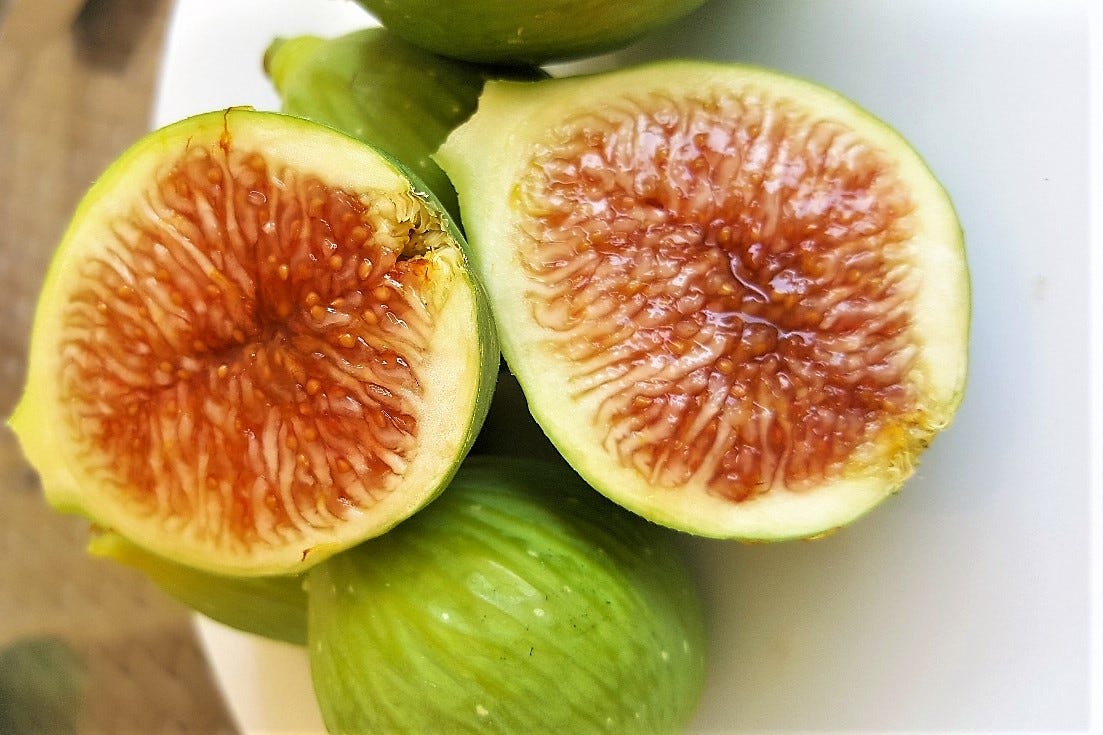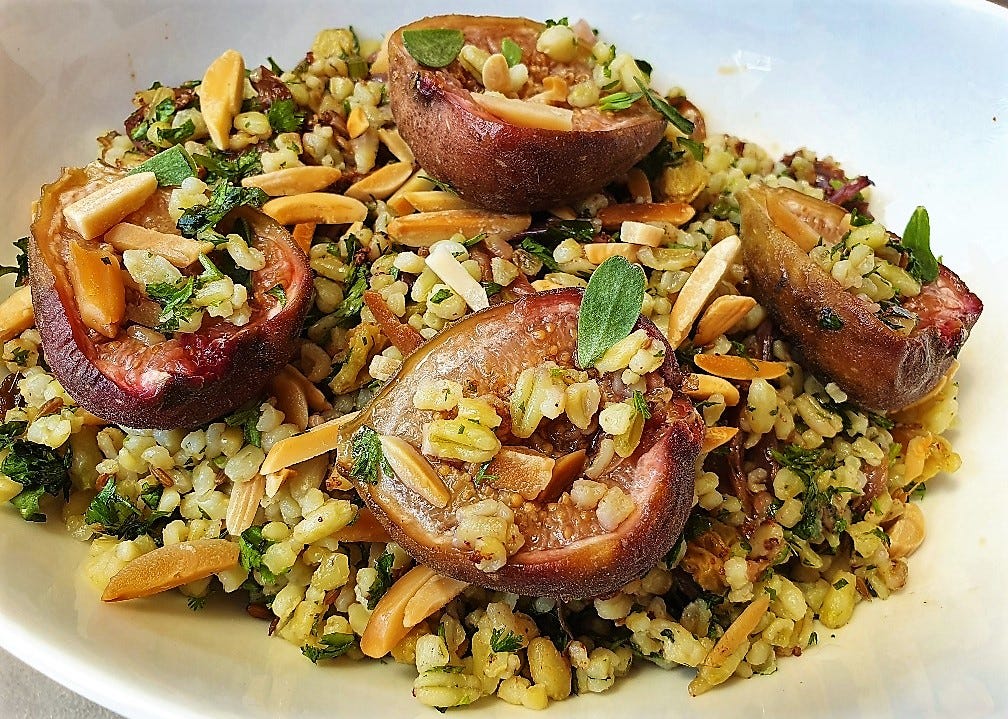I am writing this article in memory of the inspirational Jewish food writer Marlena Spieler, who sadly and so unexpectedly passed away last week. We met in Macau in 2019 at the Gourmand Cookbook Awards, where a true friendship was borne out of a common love of food, traditional upbringing and much laughter…
I chose to write about the majestic fig; a fruit that we both loved to eat and significant to our Jewish heritage. As the Middle Eastern summer truly gets underway, the season for these plump, sweet fruits begins. Figs are indigenous to both the ancient biblical landscape and the culinary culture of Italy, where Marlena wrote so many of her joyful, tasty tales and recipes from, always championing the local, seasonal produce.
Figs are one of the seven species that are also known as the ‘first fruits’ afforded to the Israelites, in order to nourish and sustain them from a bountiful land, “a land with wheat and barley, vines and fig trees, pomegranates, olive oil and honey” Deuteronomy 8:8. The oldest of all the biblical fruits, fig trees (Ficus carica) flourished in the Garden of Eden. The large, fan-shaped leaf that covered Eve’s naked body was thought to have been the Tree of Knowledge of Good and Evil and therefore considered by religious scholars, to have been the forbidden fruit.
Wild remnants of figs have been found during archeological excavations in the foothills of the Judean mountains dating back to the Neolithic era, leading archaeobotanists to consider that figs were the first cultivated fruits within the Mediterranean Basin. The fig is symbolic across the three Abrahamic faiths attributing cultural, medicinal and spiritual importance in their holy teachings and texts, as cited in the Bible, Torah and Quran.
Figs have delighted the palates of Ancient Egyptians, Greeks and Romans. Author and naturalist Pliny the Elder (32AD - 79AD) sung the praises of the restorative qualities of the fig, stating “they are the best food that can be eaten by those who are brought low by fatigue, long sickness and are on the way to recovery, including sexual recovery. They increase the strength of young people, preserve the elderly in better health and make them look younger with fewer wrinkles.”
A versatile fruit, there are over 100 species of the sweet, plump fig, with edible leaves. Fresh or dried, the permutations for pairing figs with meat, cheese, wine, honey, almonds, lemons and fresh herbs are endless in both savoury and sweet dishes, with signature combinations in the Italian, Spanish and Middle Eastern cuisines. The health benefits packed into this nutritious sphere is plentiful. Rich in potassium, calcium, and vitamin C, dietary fiber and antioxidants, figs are enjoyed as part of a nourishing diet across the continents.
Raw and fresh, grilled for caramelisation, poached for softness, or cooked gently, the recipes for salads, cakes, puddings, jams, chutneys using both forms of the the fig, are endless, with each chef, baker or home cook placing their own twist on the dish, depending on the ingredients available to them, season and individual taste buds.
This is my recipe for roasted figs naturally paired with freekeh. It is a wonderful salad served at room temperature, perfect for a healthy lunch with friends and needs no more than some fresh green leaves and a glass of cold white wine. It combines nuttiness, earthiness and sweetness with the warmth of the Middle Eastern spicing of baharat, cumin and cinnamon. Enjoy!
FREEKEH WITH ROASTED FIGS, CARAMELISED ONIONS & ALMONDS serves 4 -6
Ingredients:
1 cup / 2oog freekeh, soaked in cold water for 5 minutes & drained
6 - 8 tablespoons of extra virgin olive oil
1 teaspoon cumin seeds
1 large or 2 small red onions, finely sliced
1 teaspoon ground cumin
1 1/2 teaspoons baharat
1 teaspoon sweet paprika
½ teaspoon cinnamon
a good handful of fresh coriander, finely chopped
4 figs, halved
sprigs of thyme
¼ cup / 50 g golden raisins
1/4 cup / 50 g slithered almonds, toasted if desired
sea salt & freshly ground pepper
micro herbs
for the dressing:
4 tablespoons extra virgin olive oil
3 tablespoons date syrup
2 tablespoons lemon juice
a generous pinch of sea salt & plenty of freshly ground pepper
Method:
place 1 tablespoon of olive oil in a saucepan & add the cumin seeds, fry for 1-2 minutes moving the seeds around the pan, to release the flavour, add the drained freekeh, coat in the fragrant oil then cover to 1” / 2cm above the freekeh with boiling water, simmer without a lid for 15 - 20 minutes until the water has been absorbed and the grain is soft, but maintaining its bite, turn off the heat & cover with a tight-fitting lid & steam for 15 minutes
place the ground spices in a bowl & mix to combine, at the same time place the golden raisins in a cup & cover with boiling water for 5 minutes to plump them up, drain & set aside
place 2 tablespoons of olive oil in a frying pan, add the sliced onions & spice mix & fry for 8-10 minutes on a medium heat, stirring occasionally to prevent them sticking to the pan, until the onions are soft & caramelised
preheat the oven to 170C / 375F / GM5, halve the figs & place in a roasting tin, brush the cut side of each fig with olive oil & season with salt & pepper, add a few sprigs of thyme & place in the oven for 8 minutes until lightly roasted and just beginning to release their juices, remove & set aside
mix all the dressing ingredient together in a bowl & set aside
assemble the salad by placing the freekeh in a serving dish, add the chopped coriander, raisins, almonds & the caramelised onions with all the spicy oil from the pan, mix through to combine & drizzle over the syrupy dressing, add the roasted figs & garnish with a few extra almonds & some micro herbs
The fig tree is the international symbol of abundance, richness and prosperity. Highly regarded for its beauty and wisdom, the fig has been celebrated throughout history representing love and success.
Marlena enriched all our lives with her love and friendship. She will be remembered worldwide for her copious enthusiasm for all things food related, her generosity, kindness and her beautiful and passionate writing about her culinary heritage. She was always so supportive of me and particularly when I started writing Cultural Bites.
“Ruth Nieman takes us to her home, a land also home to the three Abrahamic faiths, and once we are there, feeds us with dishes and foodways that are ancient and/or modern, and some which are both, such as the grain Freekeh”. Marlena Spieler
She will be missed by everyone.
“








Thank you for the lovely tribute to Marlena. She certainly was a memorable, larger than life character. I didn't know her well until we bonded in Strasbourg over a love of foie gras and red lipstick. She and her spotted bag will be missed.
And thank you for the lovely fig recipe. Wish I could get decent figs!
Clarissa
Oh my goodness I have just found this Thankyou I have tears streaming down my face as I write Beaitiful and I have learned so much .On the day Marlena qently slipped away she said her next book will be finished the following week and manuscript sent to publisher Her Publisher rang yesterday to say it is n0t a cookery book and is about her struggles with smell and taste after her 2011 accident and how it took many years to retrain herself It will be an inspiration and publisher said it is her legacy book
Thankyou for this wonderful tribute